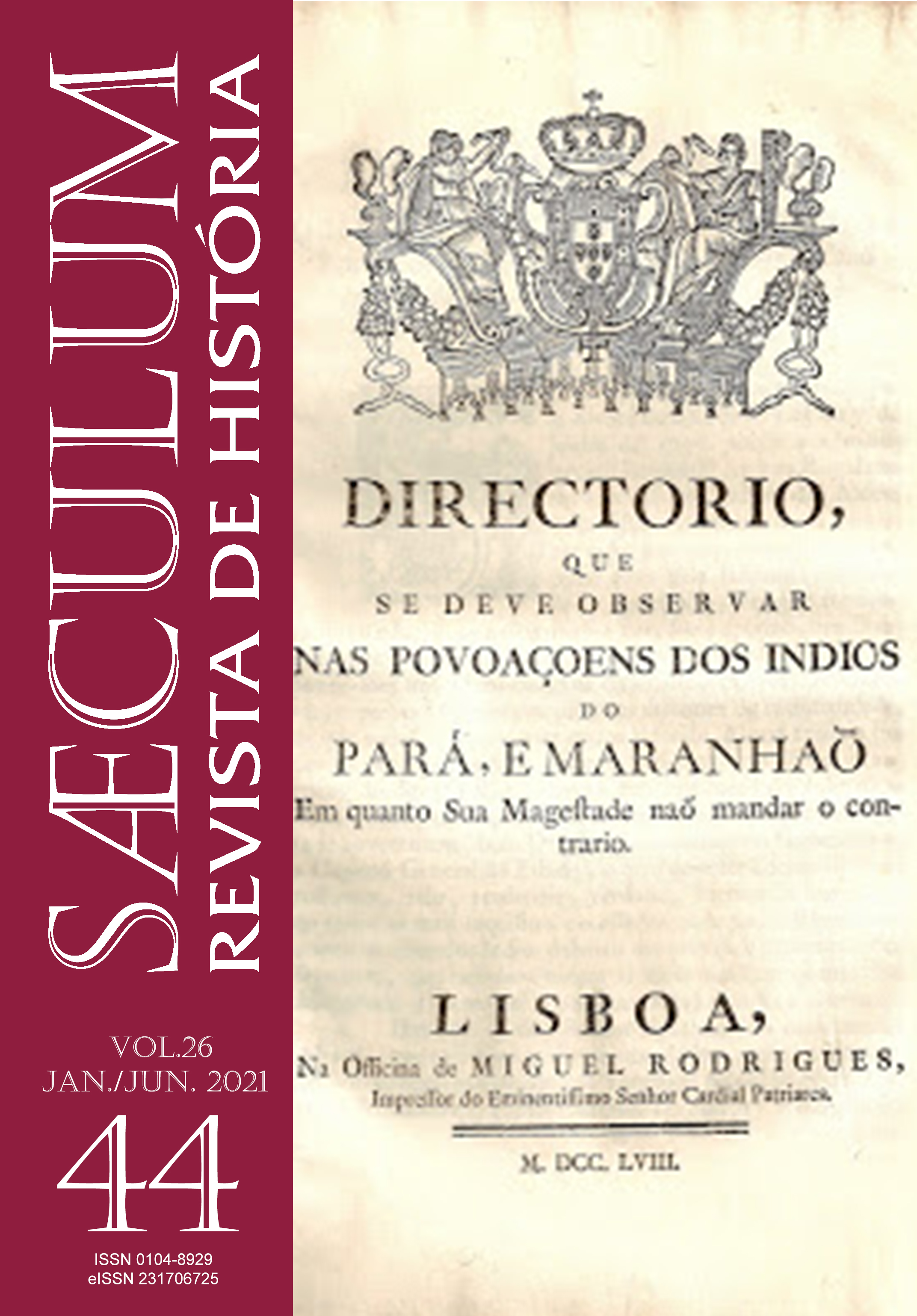“Misery and poverty” in indigenous villages under the Pombaline Directory
Economic conditions, subsistence production and indigenous resistances
DOI:
https://doi.org/10.22478/ufpb.2317-6725.2021v26n44.57909Keywords:
Marquis of Pombal's indigenous legislation, Indian villages economic life, Indigenous povertyAbstract
The difficulties of production and access to basic foods in the colonial period are circumstances that are always reported in the current documentation. In the indigenous villages, ordered by the Marquis of Pombal, through the Directory of Indians, this reality was even more devastating at the end of the 18th century. The economic situation of the villagers was affected by the periodicity of the droughts; the demands of Portuguese Braziliansettlers and authorities due to the regional and international market; the structure of the division of land into small lots that accelerated the process of land impoverishment; and by imposing on the Indians the provision of services to the colonists. The consequent low productivity caused by this set of circumstances can be verified through the assessment of titles paid by villainous Indians and registered in the nominal lists prepared by the directors of indians, according to the order of the Directory. The values calculated show a poverty below levels of survival needs, indicating that the economic life of the villagers in Rio Grande was, to a large extent, subsistence oriented, inserted in the limits of poverty, vulnerable to climate instabilities and under the colonial demands for land and workers. On the other hand, we cannot fail to consider the insistent indigenous resistance to accept the economic rules that the Directory wanted to impose. Even though it is not explicit in the consulted documentation, this resistance can be perceived when considering that subsistence was the economic objective of the indigenous agricultural tradition, thus, continue planting only what was eaten can be considered as a way to oppose colonial domination and exploitation.
Downloads
References
Referências
BARICKMAN, Bert. “Tame Indians”, “wild heathens” and settlers in southern Bahia in the late eighteenth and early nineteenth centuries, The Americas, v. 51, n. 3, p. 325-368, jan. 1995.
CUNHA, Manuela C. da (Org.). História dos Índios no Brasil. São Paulo: FAPESP, SMC, Companhia das Letras, 1992.
DOMINGUES, ngela. Quando os índios eram vassalos: civilização e relações de poder no Norte do Brasil na segunda metade do século XVIII. Lisboa: Comissão Nacional para as Comemorações dos Descobrimentos Portugueses, 2000.
GUERRA, Felipe. Secas do Nordeste. Natal: Centro de Imprensa, 1951.
KOSTER, Henry. Viagens ao Nordeste do Brasil, 2. ed. Recife: Governo do Estado de Pernambuco, 1978.
LINHARES, Maria Yedda. A pecuária e a produção de alimentos na colônia. In: SZMRECSÁNYI, Tamás (Org.) História Econômica do período colonial. São Paulo: HUCITEC: FAPESP, 1996. p. 109-122.
LINHARES, Maria Yedda; SILVA, Francisco Carlos Teixeira da. Terra prometida: uma história da questão agrária no Brasil. Rio de Janeiro: Campus, 1999.
LOPES, Fátima Martins. Índios, colonos e missionários na colonização da Capitania do Rio Grande do Norte. Mossoró: Fundação Vignt-Un Rosado, 2003.
LOPES, Fátima Martins. Em nome da Liberdade: as vilas de índios do Rio Grande do Norte sob o Diretório Pombalino no século XVIII. Rio de Janeiro: PUBLIT, 2015.
MEDEIROS FILHO, Olavo de. O engenho Cunhaú à luz de um inventário. Natal: Fundação José Augusto, 1993.
PALACIOS, Guillermo. Agricultura camponesa e plantations escravistas no Nordeste oriental durante o século XVIII. In: SZMRECSÁNYI, Tamás (org.) História econômica do período colonial. São Paulo: HUCITEC, FAPESP, 1996. p. 35-53.
PEREIRA, Joaquim José. Memória sobre a extrema fome e triste situação que se achava o sertão da Ribeira do Apody [1798], Revista do IHGRN, tomo 20, p. 175-183, 1957.
SCHWARTZ, Stuart. Segredos internos: engenhos e escravos na sociedade colonial. São Paulo: Companhia das letras, 1988.
SILVA, Lígia Osório. Terras devolutas e latifúndio. Campinas: Ed. da UNICAMP, 1996.
TAKEYA, Denise Monteiro. Um outro Nordeste: algodão na economia do Rio Grande do Norte (1880-1915). Fortaleza: BNB-ETENE, 1985.
TAVARES DE LIRA, Augusto. História do Rio Grande do Norte. Natal: Instituto Histórico e Geográfico do Rio Grande do Norte, 1998.
Downloads
Published
How to Cite
Issue
Section
License
Copyright (c) 2021 Fátima Martins Lopes

This work is licensed under a Creative Commons Attribution-NonCommercial 4.0 International License.
A revista Sæculum permite aos autores a manutenção dos direitos autorais pelo seu trabalho, no entanto eles devem repassar direitos de primeira publicação ao periódico.











